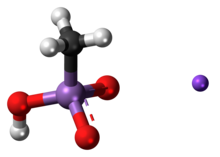Monosodium methyl arsonate
This article needs additional citations for verification. (February 2018) |

| |

| |
| Names | |
|---|---|
| IUPAC name
Sodium hydrogen methylarsonate
| |
| Other names
Monosodium methyl arsenate; sodium methylarsonate; monosodium methane arsonate; methyl arsonic acid monosodium salt; EPA Pesticide Chemical Code 013803
| |
| Identifiers | |
3D model (JSmol)
|
|
| Abbreviations | MSMA |
| ChemSpider | |
| ECHA InfoCard | 100.016.815 |
PubChem CID
|
|
| UNII | |
CompTox Dashboard (EPA)
|
|
| |
| |
| Properties | |
| CH4AsNaO3 | |
| Molar mass | 161.95 g/mol |
Except where otherwise noted, data are given for materials in their standard state (at 25 °C [77 °F], 100 kPa).
| |
Monosodium methyl arsenate (MSMA) is an arsenic-based herbicide. It is an organo-arsenate; less toxic than the inorganic form of arsenates. However, the EPA states that all forms of arsenic are a serious risk to human health and the United States' Agency for Toxic Substances and Disease Registry ranked arsenic as number 1 in its 2001 Priority List of Hazardous Substances at Superfund sites.[1]
Arsenic is classified as a Group-A carcinogen.[1] The EPA states that:[2]
Arsenate (AsV) is the oxidized form and occurs in well-aerated soils, whereas in chemically-reduced soil environments, arsenite (AsIII) is the prevalent As form. Although arsenite is more toxic than arsenate, arsenate can also have deleterious effects on humans, plants, and microorganisms. Arsenic-contaminated soils pose serious risk to human health. The EPA also states that, while contaminated soil poses a serious risk to health, arsenic frequently mobilizes from soils and other sources, ending up in water where it is even more of a toxicity issue.
Trade names include:
- Target 6 Plus
- Target 6.6
- MSMA 6 Plus
- MSMA 6.6
References
[edit]- Agency for Toxic Substances & Disease Registry. "Arsenic Toxicity Case Study". Environmental Health and Medicine Education. Retrieved 25 December 2013.
- MAA Research Task Force. "Organic Arsenical Products Task Force".
- National Library of Medicine. "Sodium Methanearsonate". HSDB Database.
- Specific
- ^ a b Dibyendu, Sarkar; Datta, Rupali (2007). "Biogeochemistry of Arsenic in Contaminated Soils of Superfund Sites". EPA. United States Environmental Protection Agency. Retrieved 25 February 2018.
- ^ Carelton, James (2007). "Final Report: Biogeochemistry of Arsenic in Contaminated Soils of Superfund Sites". EPA. United States Environmental Protection Agency. Retrieved 25 February 2018.
